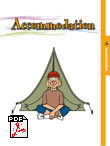- TOOL KITS
- A. The NEXT Step
- B. Promoting Independence
- C. Phone Apps
- D. Return to Work
- E. Motivational Interviewing
- F. Paediatric Brain Injury Rehabilitation Resources
- a) Introduction
- 0. Introduction
- 1. Transition
- 2. The transition wheel
- 3. Walking around the transition wheel
- 4. The transition wheel interview
- 5 . Using this kit
- 6 . Web resources
- b) Working together
- 7. My role
- 8 . My family's role
- 9. My case manager's role
- c) What can I do?
- 10. Who, where, what? The Services I receive
- 11. Accommodation
- 12. Driving
- 13.Alcohol and drugs
- 14. Social and recreational activities
- 15. Health and well-being
- 16. Relationships and friendships
- 17. Sexuality
- 18. Personal safety
- 19. Complaints/rights
- 20. Legal issues
- 21. Centrelink
- 22. Financial
- 23. Shopping
- 24. Employment, training and tertiary education
11. Accommodation
LIVING at home
When you leave school it does not mean you always leave home. In fact it is a good idea when you finish school and start to do more study or work to have your family around you to support you through this change. Living at home is a great way to get this support and it is cheaper than moving out.
If you do live at home there are some things your family may want you to help with:
- Your parents may have already talked with you about having to pay ‘board’. When you start earning money or start getting money from Centrelink many parents think that you should help contribute to the electricity, the phone or water that you use. This is what board is, helping to pay for the things you use in the house.
- Your family may also ask that you help with some of the jobs around the house. Some jobs include vacuuming, mowing the lawns, washing your clothes, stacking and emptying the dishwasher.
It may be a good idea to sit down and discuss with your family what they expect you to help with.
LIVING away from home
Life may get a little crowded for you at home and you may want to move out. There are a few things to think about before you make the big move.
- Think about whether you want to rent a place for yourself or share a place with others for a bit of company. Sharing will reduce the amount you have to pay in rent. Make sure there are house rules and rosters for cleaning, cooking and shopping. These need to be talked about before you move in and sign the paperwork.
- If you do decide to move out of home you need to think about how much it will cost before you make the move. Write a list of all the big items you will have to pay for such as rent, electricity, telephone, food, and gas. These need to be paid for once a week or every one to three months. Remember that you will also have to pay bond money before you move in. This is a one-off payment that is usually equal to four weeks rent.
- Setting up your own place will also cost money. You will need chairs, couches, tables, a fridge, washing machine, a bed, a cupboard, maybe a TV, cleaning equipment, plates, cups, bowls, cutlery, cooking equipment. There are many other things you will need. If you are sharing with other people you may find they have some of these items. Make sure you find out what they already have before you buy all the items. Why not make a list of everything you need. Get your parents to have a look at your list. You do not want to miss an essential item! Perhaps your parents may even have some items they no longer use and can lend them to you.
To help with the costs of moving out of home:
• Write a budget for yourself. Include ‘one off ’ items you will need to buy such as a washing machine and a couch, plus on-going expenses such as food, clothes, money for entertainment and the bills.
• Contact Centrelink to tell them your plans. You may find that they can help with some of the expenses. (See the information sheet on Financial Issues)
Other useful tools
Use Toolkit B Promoting Independenc for useful tools and strategies.


